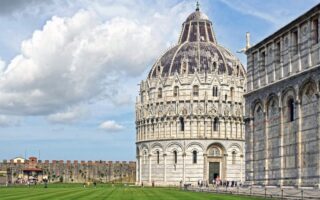In the Catholic Church, a cardinal is a high-ranking official who is appointed by the Pope to serve as an advisor and leader within the Church. Cardinals are responsible for electing the Pope and are often given important roles within the Vatican and other Church institutions. They wear distinctive red robes and are considered to be among the most senior members of the clergy.
Table of Contents
History of the Cardinal Title
Have you ever wondered what exactly a “Cardinal” is in the Catholic Church? Well, you’re not alone! The title of Cardinal holds a significant role within the hierarchy of the Church, and its origins can be traced back to the early days of Christianity.
In the Catholic Church, a Cardinal is a high-ranking official who is appointed by the Pope. The title of Cardinal comes from the Latin word “cardo,” which means “hinge.” This is fitting, as Cardinals are considered to be the “hinges” of the Church, playing a crucial role in the governance and administration of the Church.
The history of the Cardinal title dates back to the early days of the Church, when the Pope would appoint trusted advisors to assist him in his duties. These advisors were known as Cardinals, and over time, the title became associated with a select group of bishops who were given the responsibility of electing the Pope.
One of the most important roles of Cardinals is their participation in the conclave, the secret meeting held to elect a new Pope. Cardinals from around the world gather in the Vatican to choose the next leader of the Catholic Church. This process is steeped in tradition and ceremony, with each Cardinal casting his vote in a solemn and prayerful manner.
In addition to their role in electing the Pope, Cardinals also serve as advisors to the Pope on matters of doctrine, governance, and administration. They are often given important positions within the Vatican, such as heading up key departments or serving as Papal legates to other countries.
The title of Cardinal is considered to be a great honor within the Catholic Church, and it is typically given to bishops who have demonstrated exceptional leadership, wisdom, and dedication to the Church. Cardinals are often chosen from among the most senior and respected members of the clergy, and their appointment is seen as a recognition of their years of service and commitment to the Church.
While the role of Cardinal is steeped in tradition, it has evolved over the centuries to reflect the changing needs of the Church. Today, Cardinals play a vital role in shaping the direction of the Church and ensuring that its teachings and practices remain true to the teachings of Christ.
In conclusion, the title of Cardinal in the Catholic Church is a prestigious and important position that carries with it great responsibility and honor. Cardinals are trusted advisors to the Pope, key decision-makers within the Church, and guardians of its traditions and teachings. Their role in electing the Pope and guiding the Church is essential to the continued strength and vitality of the Catholic faith. So, the next time you hear the term “Cardinal” mentioned in relation to the Catholic Church, you’ll have a better understanding of the significance of this important title.
Role and Responsibilities of Cardinals
Cardinals play a crucial role in the Catholic Church, serving as advisors to the Pope and participating in the election of a new Pope when the need arises. But what exactly is a Cardinal, and what are their responsibilities within the Church?
In the Catholic Church, Cardinals are appointed by the Pope and are considered the highest-ranking clergy members below the Pope himself. They are typically bishops or archbishops, although in some cases, priests and deacons can also be appointed as Cardinals. The title of Cardinal is a prestigious one, and it comes with a number of important responsibilities.
One of the primary roles of Cardinals is to serve as advisors to the Pope. They are often called upon to provide guidance and counsel on a wide range of issues, from matters of doctrine and theology to practical matters of governance within the Church. Cardinals are known for their wisdom and experience, and their advice is highly valued by the Pope and other Church leaders.
In addition to their advisory role, Cardinals also play a key role in the governance of the Church. They are members of various Vatican departments and councils, where they help to shape Church policy and make important decisions on a wide range of issues. Cardinals are also responsible for overseeing the administration of dioceses and archdioceses around the world, ensuring that the Church’s teachings are being faithfully upheld and that the needs of the faithful are being met.
Perhaps the most important responsibility of Cardinals, however, is their role in the election of a new Pope. When a Pope dies or resigns, it is the Cardinals who gather in conclave to choose his successor. This process is steeped in tradition and ritual, with the Cardinals meeting in secret to pray, deliberate, and ultimately cast their votes for the next Pope. It is a solemn and sacred duty, and one that carries immense weight and responsibility.
Overall, Cardinals play a vital role in the life of the Catholic Church. They are trusted advisors to the Pope, key decision-makers in the governance of the Church, and guardians of its teachings and traditions. Their wisdom, experience, and dedication to the faith make them invaluable members of the Church hierarchy, and their contributions are felt throughout the world.
In conclusion, Cardinals are an essential part of the Catholic Church, serving as advisors to the Pope, leaders in the governance of the Church, and key participants in the election of a new Pope. Their responsibilities are varied and important, and their contributions to the life of the Church are immeasurable. Cardinals are truly the shepherds of the Church, guiding and protecting the faithful in their journey of faith.
Selection and Appointment Process of Cardinals

Have you ever wondered what exactly a “Cardinal” is in the Catholic Church? Well, you’re not alone! Many people are curious about the role and significance of Cardinals within the Church. In this article, we will explore the selection and appointment process of Cardinals, shedding light on this important aspect of the Catholic hierarchy.
The process of selecting and appointing Cardinals is a carefully orchestrated one, steeped in tradition and protocol. Cardinals are chosen by the Pope, who has the authority to appoint these high-ranking officials within the Church. The selection process typically involves a combination of factors, including the individual’s reputation, experience, and dedication to the Church.
One of the key criteria for becoming a Cardinal is a strong commitment to the teachings and values of the Catholic Church. Cardinals are expected to be devout and faithful servants of God, upholding the teachings of the Church and serving as spiritual leaders to the faithful. In addition to their religious devotion, Cardinals are also expected to possess a deep understanding of Church doctrine and theology.
Another important factor in the selection process is the individual’s track record of service within the Church. Cardinals are often chosen from among the ranks of bishops, who have demonstrated their leadership and dedication to the Church through their work in their respective dioceses. Bishops who have shown exceptional leadership skills and a strong commitment to the Church’s mission are often considered for elevation to the rank of Cardinal.
In addition to their religious and leadership qualities, Cardinals are also expected to possess a high level of integrity and moral character. The role of Cardinal is one of great responsibility, and those who hold this position are expected to set a positive example for others to follow. Cardinals are called to be beacons of light and hope in a world that is often filled with darkness and despair.
Once a Cardinal is appointed by the Pope, they are given a special red hat and ring, symbolizing their new role within the Church. The red color of the hat and ring is meant to symbolize the Cardinal’s willingness to shed their blood for the Church, if necessary. This symbolic gesture serves as a reminder of the sacrifices that Cardinals are called to make in service to the Church and its mission.
In conclusion, the selection and appointment process of Cardinals is a rigorous and carefully considered one. Those who are chosen to serve as Cardinals are expected to embody the highest ideals of the Catholic Church, serving as spiritual leaders and guides to the faithful. Cardinals play a crucial role in the governance and leadership of the Church, and their dedication and commitment to the Church’s mission are truly commendable. So, the next time you see a Cardinal in their distinctive red attire, remember the important role they play within the Catholic Church and the significance of their appointment by the Pope.
Cardinal Ranks and Hierarchy in the Catholic Church
Have you ever wondered what exactly a “Cardinal” is in the Catholic Church? If you’re not familiar with the inner workings of the Church, the term might seem a bit mysterious. But fear not, I’m here to shed some light on this important role within the Catholic hierarchy.
In the Catholic Church, a Cardinal is a high-ranking official who is appointed by the Pope. Cardinals are considered the “princes of the Church” and play a crucial role in advising the Pope, electing a new Pope, and governing the Church. They are often seen as the Pope’s closest advisors and are responsible for overseeing various aspects of Church administration.
There are three main ranks of Cardinals within the Catholic Church: Cardinal Bishop, Cardinal Priest, and Cardinal Deacon. Each rank has its own responsibilities and duties within the Church hierarchy.
Cardinal Bishops are the highest-ranking Cardinals and are typically assigned to oversee a diocese or a group of dioceses. They are responsible for the spiritual and administrative oversight of their assigned areas and play a key role in the governance of the Church.
Cardinal Priests are the next highest-ranking Cardinals and are typically assigned to oversee a particular church or basilica in Rome. They are responsible for the spiritual and pastoral care of their assigned church and play a key role in the liturgical life of the Church.
Cardinal Deacons are the lowest-ranking Cardinals and are typically assigned to oversee various administrative tasks within the Church. They assist the Pope and other Cardinals in carrying out their duties and play a key role in the day-to-day operations of the Church.
In addition to their ranks, Cardinals are also divided into two categories: Cardinal Electors and Cardinal Non-Electors. Cardinal Electors are Cardinals who are under the age of 80 and are eligible to participate in the election of a new Pope. Cardinal Non-Electors are Cardinals who are over the age of 80 and are not eligible to participate in the papal conclave.
The process of becoming a Cardinal is a lengthy and rigorous one. Cardinals are typically chosen from among the most senior bishops and archbishops in the Church and are appointed by the Pope. Once appointed, Cardinals are given a red hat and a ring, which symbolize their status as Cardinals and their commitment to the Church.
Overall, Cardinals play a crucial role in the governance and administration of the Catholic Church. They are responsible for advising the Pope, overseeing various aspects of Church administration, and participating in the election of a new Pope. While the role of Cardinal may seem mysterious to some, it is an important and integral part of the Catholic hierarchy.
Controversies and Criticisms Surrounding Cardinals in the Catholic Church
Cardinals in the Catholic Church hold a significant role within the hierarchy of the Church. They are appointed by the Pope and serve as his advisors and collaborators in governing the Church. The title of cardinal is one of the highest honors that can be bestowed upon a member of the clergy, and it comes with a great deal of responsibility and influence.
However, the role of cardinals in the Catholic Church has not been without controversy and criticism. One of the main criticisms surrounding cardinals is the lack of transparency in their selection process. The Pope has the sole authority to appoint cardinals, and this process is often shrouded in secrecy. Critics argue that this lack of transparency can lead to favoritism and nepotism in the selection of cardinals, undermining the credibility of the Church.
Another criticism of cardinals in the Catholic Church is their perceived wealth and opulence. Cardinals are often seen as living lavish lifestyles, with access to expensive homes, cars, and other luxuries. This has led to accusations of hypocrisy, as the Church preaches humility and simplicity while some of its highest-ranking members appear to live in luxury.
Furthermore, some critics argue that the power and influence wielded by cardinals can lead to abuses of power within the Church. There have been instances of cardinals being involved in scandals, such as financial impropriety or covering up cases of sexual abuse. These scandals have damaged the reputation of the Church and eroded trust in its leadership.
Despite these controversies and criticisms, cardinals play a crucial role in the governance of the Catholic Church. They are responsible for electing the Pope, and they serve as advisors to the Pope on matters of doctrine and policy. Cardinals also hold key positions within the Vatican, overseeing various departments and agencies that help to run the Church.
It is important to note that not all cardinals are implicated in controversies or scandals. Many cardinals are dedicated servants of the Church, working tirelessly to promote the teachings of Jesus Christ and to serve the needs of the faithful. These cardinals are often involved in charitable work, advocating for social justice, and promoting peace and reconciliation in the world.
In conclusion, cardinals in the Catholic Church hold a position of great honor and responsibility. While there have been controversies and criticisms surrounding the role of cardinals, it is important to recognize the valuable contributions that many cardinals make to the Church. By promoting transparency, accountability, and humility, cardinals can help to restore trust and credibility in the leadership of the Catholic Church. Ultimately, the role of cardinals is to serve the Church and its members, and to uphold the teachings of Jesus Christ in all that they do.
Conclusion
In the Catholic Church, a cardinal is a high-ranking official who is appointed by the Pope to assist him in governing the Church and electing a new Pope when necessary. Cardinals are typically senior bishops or archbishops who have demonstrated exceptional leadership and service to the Church. They are often given the title of “prince of the Church” and wear distinctive red robes and hats to signify their rank. Overall, cardinals play a crucial role in the governance and administration of the Catholic Church.


